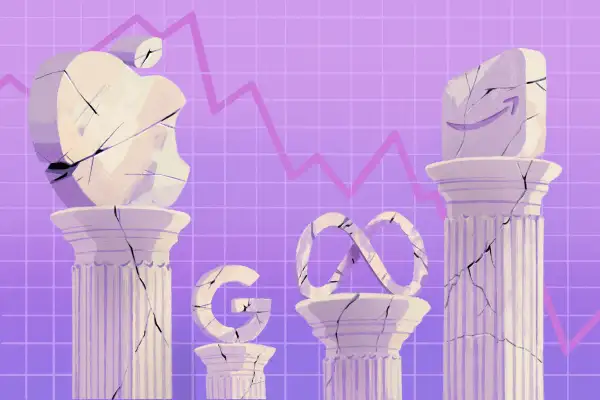What Big Tech’s ‘Identity Crisis’ Means for Investors
Money is not a client of any investment adviser featured on this page. The information provided on this page is for educational purposes only and is not intended as investment advice. Money does not offer advisory services.

Big tech is at a crossroads.
For the last decade, high-flying tech giants have powered returns for investors and helped push major indexes to record high after record high. The tech industry alone now makes up more than a quarter of the S&P 500 index, with Apple, Microsoft and Amazon leading the pack, according to data from S&P Dow Jones Indices. Google-parent Alphabet and Meta are not far behind them.
In a way, big tech is the market, says Jeffrey Buchbinder, chief equity strategist for LPL Financial. He points to Apple's recent strength as an example: This year, Apple alone is responsible for roughly 20% of the S&P’s returns. Another 17% comes from Microsoft, according to S&P data.
But last year, rising interest rates and the threat of an economic slowdown brought many of the biggest names in tech back down to earth. In 2022, the tech-heavy Nasdaq composite lost a staggering 30% of its value.
Now, as turmoil in the banking sector roils investor confidence, tech stocks are rebounding — even as interest rates keep increasing. Tech stocks are also rising despite the tens of thousands of layoffs across their industry that began last year and have continued.
“A lot of investors are looking toward big tech and seeing them as more defensive stocks at the moment,” says Callie Cox, a U.S. investment analyst at eToro. She points to tech’s strong profit margins and ample cash reserves. Buchbinder, meanwhile, emphasizes the sector's stable performance over time and competitive advantage in the economy.
Tech companies’ competitive position is strong enough to make them less sensitive to economic cycles, which makes the stocks more resilient during downturns, he says
Tech’s ‘identity crisis’
So are tech stocks the new safe haven? And will they continue to dominate the market? No one has a crystal ball when it comes to the stock market, but it’s clear that tech stocks are evolving.
The Federal Reserve has been hiking interest rates for more than a year in an effort to bring down inflation. Rate hikes make it more difficult for business and consumers to borrow money, which can in turn weigh on stock prices — and tech stocks were hit especially hard.
In the aftermath of those losses in 2022, Cox says tech companies are now being forced to balance profitability in the short term with the long-term innovation that helped them come to dominate the market in the first place.
“It's like they're having an identity crisis,” she says. “Am I this like, big, durable, slow-moving company? Or am I this cutting edge company that people grew to know me as in the 2010s?”
What's next for the tech stock rally?
Not everyone is optimistic that tech stocks will extend their most recent rally.
Earlier this year, for instance, Bank of America equity strategist Savita Subramanian pointed to high interest rates and a persistent bear market — a drop of 20% or more from a previous high — as signals that the era of tech dominance might be coming to an end.
She argued that the “old economy” (like energy companies, industrial firms and even homebuilders) has struggled for capital for a decade while tech firms have “enjoyed free money” thanks to their popularity and a low interest rate environment. Now, Subramanian wrote, “we see the pendulum swinging back to the old economy.”
Morgan Stanley strategist Michael Wilson has taken a similar view. While tech outperformed this spring as investors began viewing the sector as defensive (especially amid turmoil in the banking sector), Wilson warned investors not to get used to the rally.
In a research note last month, he wrote that the tech sector tends to be more volatile than the market as a whole and more susceptible to macroeconomic changes than traditional defensive industries, adding that investors looking for a safe haven would do better with investments in healthcare or utilities.
Tech companies will likely continue to dominate
Over the long term, however, investors shouldn’t expect tech companies to fade into the background.
“Demand for what big tech does is probably going to continue to be strong for quite some time,” Buchbinder says. He notes that tech companies have strong profit margins and help facilitate productivity in the economy — not to mention the fact that tech companies are so established now that they can be considered consumer staples (companies that provide essential goods and services on a daily basis).
Of course, that doesn’t mean tech will have an easy path ahead. Regulators have been scrutinizing tech giants like Google and Meta as some politicians in Washington D.C. argue that these behemoths have an outsize influence on the economy and should be broken up.
“While there’s another decade or many decades of prosperity for big tech ahead of us,” Buchbinder adds, “the road to that prosperity will get tougher.”
Investors May Be Getting Too Hopeful About Better-Than-Expected Tech Earnings
Why Tech Stocks Are Doing Especially Poorly During the Market Selloff
Congratulations! You Won Big Betting on Tech Stocks. Now Start Selling Them

